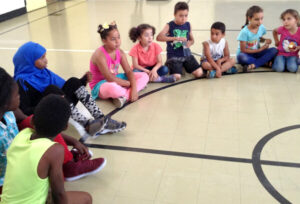Change can be a scary thing. For siblings, Zain (6), Jamal (8), and Dina (9), change and fear were common to their childhood. Zain, Jamal and Dina grew up in Syria where there has been ongoing conflict for several years.
Earlier this year, the family finally found safety and refuge when they immigrated to Hamilton, Ontario, as part of the re-settlement of 25,000 plus Syrian refugees across Canada. While their new home offers assurances of a better future, social and cultural changes pose challenges for them every day, with barriers in language being particularly hard.
This past summer, Zain, Jamal and Dina, alongside 31 other newcomer youth, predominately from Syria, were enrolled in Big Brothers Big Sisters of Hamilton & Burlington’s Connections Project Program. The program, which is funded by the Ministry of Immigration, Refugees and Citizenship Canada, traditionally takes place during the school year, however, the summer edition was implemented as a response to the recent influx of Syrian newcomer children and youth to the Hamilton area. The program ran in two simultaneous sessions, once a week, for two months during the summer.
Each session offered its members two-hours of program a week and included, crafts, board games, physical activities, lessons about Canadian culture and a culminating game afterwards for further skill development. Although, language barriers existed between mentors and mentees, they were not an obstacle. Program Coordinator, Mike Boisvert, explains that much of the program was facilitated by using hand signals and providing demonstrations. “We were able to communicate using a universal language,” he adds, that “the older kids would help translate, too.”
“Positive change, development and growth in a short period of time are some of the most notable attributes of the program”, says Boisvert. “I see the most change in this program in the shortest time,” he says about the sessional program. There are many layers to the children enrolled in the Connections Project, Boisvert explains. At the beginning of the program, kids are shy and language barriers are very apparent. “You notice their fearfulness of being open to trying new things,” he says. A shift in the children’s demeanour occurs quite quickly and naturally. “Some of their past experiences make the children have reservations, but once they feel comfortable, they easily accept new activities — they are very quick to opening themselves up to having fun!”
Some of the most noticeable developments within the program were the children’s ability to open up and trust each other and their mentors. This was especially significant as the children were getting more comfortable hearing and using English. “At the beginning of the program, the kids wouldn’t speak any English. By the end, participants started using some English vocabulary, such as ‘thank you’. You can really see how quickly they become comfortable. It’s all about relationship-building,” Boisvert says.
During the last week of the program, each mentee received a gift from their mentor. The gifts were goodie bags of odds and ends such as, markers, pencils, playing cards and hockey cards, a lunch bag and elementary-aged books. “Needless to say, they were a BIG HIT,” says Boisvert.
The last day was the most memorable day of the program for mentor, Sierra Smith. After the goodie bags were distributed, the kids played with the items they received. Smith explains: “The boys were showing each other their hockey cards and the girls were smiling, looking and pointing at pictures in each other’s books. Regardless of the fact that the children could not read the books, I observed them in a moment of sheer enjoyment.”
Smith then proceeded to read a book to a group of mentees. “By a combination of the illustrations in the book, sharing lots of eye contact, lots of laughter and inflection in my voice, we were able to read together. Reading is a passion of mine, and it was really nice to connect with the children in that way.” Because of the language barrier, Smith was unsure if the children would understand the story, but they did. But the best part was yet to come – suddenly the children realized they got to keep the goodie bags, “It was priceless,” said Smith. “It was the most touching thing that had ever happened to me, just to share those moments with the kids.”
The summer edition of the Connections Project is merely one example of how Big Brothers Big Sisters’ mentoring programs are diversifying to meet the needs of our local communities and changing demographics because mentoring matters to all children and youth.

